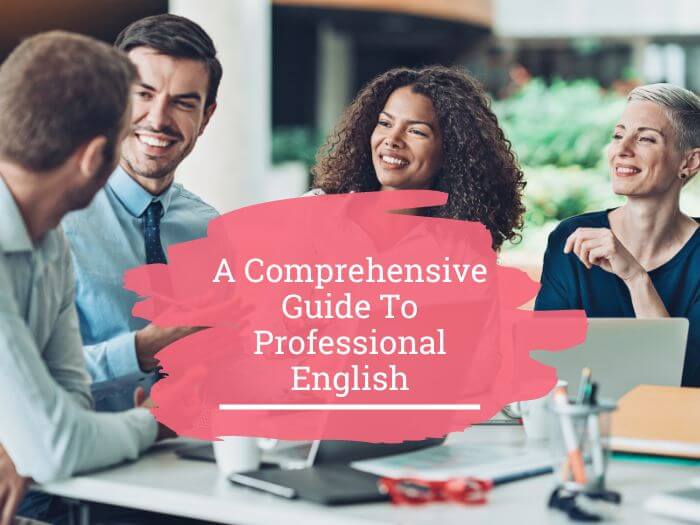What is professional English? Why is it worth learning? And what exactly can you do to improve it?
In this comprehensive guide, I’ll tell you everything you need to know about this.
Professional business people say that time is money. So let’s not waste it and dive straight into this!
What Is Professional English?

Broadly speaking, professional English refers to the language and communication skills you need to have in order to express yourself clearly and professionally in a business-oriented environment.
You may need these skills both in speaking and writing.
For example, you would need professional English when writing emails in English, attending conferences and meetings, giving presentations, or when you’re being interviewed for a job.
There are many situations and business-related interactions that might require the use of professional English and that’s why this term may mean different things to different people.
OK, now that we’ve defined what professional English is, let’s talk about why it’s important.
Why Learn Professional English?
Improving your professional English communication skills is highly valuable for three main reasons:
1. Better Career Opportunities
Professional English can open up better job opportunities and higher-level positions for you.
This is because English is the language that people from all over the world use to do business, so companies and employers want and need people who can negotiate, present, sell, interact, and establish business relationships in English.
And if you can communicate well in the workplace, you’ll make stronger connections with colleagues, clients, and other industry peers more efficiently too.
Your bosses will be happy, which means you can walk into their office and ask for a pay rise!

A Confidence Boost
Great communication skills can boost your confidence in various professional situations.
Imagine giving a speech at a business conference without having good public speaking skills.
How would you feel when walking onstage? How would that feeling impact your speech?
Now imagine the opposite situation.
You stand on stage but have the ability to maintain your audience's attention thanks to the language you use and the presentation skills you have developed. You’d deliver a much clearer talk, feel more confident, and get a more engaged audience.
And a more engaged audience means that you’d be able to help more people with the products and services that you or your company offer.
Skills bring confidence. Confidence brings self-esteem and a more profitable business.
3.Personal And Professional Development
Many international business courses, videos, websites, and magazines are in English.
So if you’re able to speak and understand professional English, you can get access to many valuable resources that can help you keep up with current business trends, news, and innovations.
You’ll become a more informed, trained, and – I hope for you – financially rewarded professional.
OK so what exactly can you do to improve your professional English?
You may think that you need to take another language course. Yes, you could do that. But there are many other fun and interesting ways to do it.
How To Develop Your Professional English Skills
Here are 10 ways to take your professional English to the next level.
1. Read Professional Content

Read articles, books in English, and magazines related to your field. This will not only help you keep yourself up to date with current news relevant to your industry but it’ll also expand your professional vocabulary.
I had a student who benefited a great deal from reading. He worked in finance and had a high level of technical vocabulary related to his field because he would always read articles from the Financial Times and The Economist.
So do some research and find interesting content you can read online.
If what you find is too hard to understand, don’t worry, I have a little trick for you.
Most online national newspapers have two versions: one in English and one in the original language.
If you’re Italian, for example, you can read business articles from the Italian newspaper “Il Corriere della Sera”. Read an article in Italian and then read the same article in English or vice versa. This will help you understand more.
These are some non-English newspapers that have an English version:
- Le Monde (France) – English version: “Le Monde Diplomatique English Version”
- El País (Spain) – English version: “El País in English”
- Deutsche Welle (Germany) – Offers news including English.
- El Universal (Mexico) – English version: “El Universal in English”
- China Daily (China) – English version: “China Daily Global Edition”
- The Asahi Shimbun (Japan) – English version: “The Asahi Shimbun Asia & Japan Watch”
- Corriere della Sera (Italy) – English version: “Corriere della Sera English”
- Folha de S.Paulo (Brazil) – English version: “Folha de S.Paulo in English”
- The Moscow Times (Russia) – English version: “The Moscow Times”
- Al Jazeera (Qatar) – Offers news in multiple languages, including English.
2. Watch A Variety Of Business-Related Videos
If you want to improve your professional English, you may think you need to watch videos of American or British business people giving presentations and talks.
Of course, that’s helpful.
But don’t just watch videos of native English speakers.
As I said, the business world welcomes people from many different countries, not just the English speaking ones like the UK, the USA, or Australia.
So a good idea is to expose yourself to a variety of accents. A great idea is to watch videos of speakers whose accent is likely to be the same as the one you need to understand in your specific work context.
- Do you work in automotive and do business with Japanese people? Watch videos of the CEO of Toyota giving a presentation.
- Do you work in the food industry and do business with Italians? Here’s just an example of the type of video you could watch.
And here are some popular YouTube channels for you. They cover various aspects of business, entrepreneurship, finance, and management.
1. Harvard Business Review: Insights and advice on leadership, management, and business strategy from Harvard Business Review.
2. Bloomberg: News, analysis, and interviews covering the global financial markets and business world.
3. CNBC: Business news, market updates, and interviews with business leaders and experts.
4. Entrepreneur: Tips, advice, and stories for entrepreneurs and small business owners.
5.GaryVee: Gary Vaynerchuk's channel focuses on entrepreneurship, marketing, and personal branding.
6. The Financial Diet: Personal finance and money management tips for young professionals and millennials.
7. Stanford Graduate School of Business: Lectures and insights from Stanford's business school professors.
8. Insider Business: News, analysis, and insights on business and technology.
9. Forbes: Interviews with billionaires, business news, and financial analysis.
10. Fast Company: Inspirational stories and innovative ideas from the world of business and technology.
Explore, learn, and have fun!
3. Explore Websites For Business English Learners
There are some really well-made websites for learners of English who would specifically want to improve their professional English skills. Most of these websites are free and suitable for intermediate to advanced levels.

Here are three you can’t miss:
- BBC Learning English: English at Work. This is a fantastic series that focuses on everyday workplace situations and gives you practical language and communication tips.
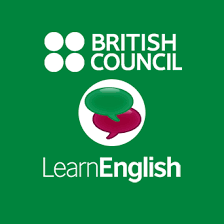
- British Council Business English. On the British Council’s website you’ll find a section dedicated to Business English. Here you’ll get lots of materials designed to help you build the skills you need to communicate effectively in the workplace, participate in meetings, write professional emails, give presentations, and much more.

- EngVid's Business English section. EngVid is a popular website that offers a variety of free English video lessons on different topics. One of them is Business English. So you’ll find a collection of detailed and engaging video lessons that focus on various aspects of English communication in professional situations.
Business vocabulary, formal and informal communication, business idioms, interview tips – there’s more than you have time for!
4. Listen To Business English Podcasts

There are lots of podcasts you can subscribe to in order to improve your professional English.
Some of these are for native English speakers (or anyone who’s got advanced English listening skills), while others are specifically made for learners like you.
Here are six podcasts for you. I’ve divided them into two categories: “Podcasts for natives” and “Podcasts for learners”. I’ve also included their original descriptions.
Podcasts For Natives

“Every Monday, host Modupe Akinola of Columbia Business School presents the most powerful and surprising ideas that illuminate the business world. After the talk, you'll get a mini-lesson from Modupe on how to apply the ideas in your own life. Because business evolves every day, and our ideas about it should, too.”
“The daily drama of money and work from the BBC.”

“Guy Raz interviews the world’s best-known entrepreneurs to learn how they built their iconic brands. In each episode, founders reveal deep, intimate moments of doubt and failure, and share insights on their eventual success. How I Built This is a master-class on innovation, creativity, leadership and how to navigate challenges of all kinds. New episodes on Mondays and Thursdays for free.”
Podcasts For Learners

Business English from All Ears English
“Want to feel more confident with your business English? Lindsay and Michelle show you real, business English vocabulary for the global economy in this podcast from All Ears English. Learn spoken English for business with native speakers. Get advanced skills for English meetings, presentations, small talk and socialising at work, job interviews, telephone English and more.”
Business English Pod: Learn Business English Online
“Learn business English conversation and listening skills, vocabulary, idioms, and more with effective business English lessons on everything from meetings, presentations, negotiations to sales, job interviews and finance.
Down to Business English: Business News to Improve your Business English

“A podcast for people who use English as a Second or Foreign Language (ESL/EFL) in their work environment and want to improve their overall language skills. In each episode, hosts Skip Montreux, Dez Morgan, and Samantha Vega discuss Business news making headlines around the world. Through their discussions, Skip, Dez and Samantha introduce English vocabulary & phrases related to business, review grammar, and identify cultural differences found in International business situations. An excellent way to improve listening comprehension skills, keep up with business trends, and advance your career.”
5. Use Self-Study Professional English Books
There are grammar books and vocabulary books that you can use to improve your general English. But there are also self-study books to develop your Professional English.
Here are four you might want to have a look at:
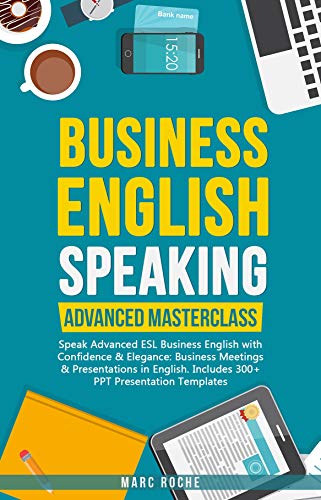
This business English book explores the psychology and dynamics of effective business communication in English and helps you develop your communication skills in a wide variety of professional situations.

This is a best-selling series that helps you learn and practice specialist vocabulary that you need to communicate at work. There are several books that cover a wide range of professions such as finance, engineering, marketing, law, ICT, management, and medicine.
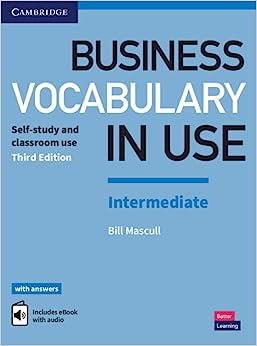
This practical book will help you learn and practice Business English vocabulary. There are two levels of proficiency: Intermediate and Advanced. Make sure you buy the one with an answer key.
Oxford Business English Express Series

Each book in the series focuses on a specific profession. For example, “English for the Pharmaceutical Industry” teaches you how to communicate effectively in different areas of pharmaceuticals.
In each unit, you’ll find authentic situations and dialogues that focus on one fundamental aspect of the industry. This series covers several professions so it’s highly likely that you’ll find the right book for you.
6. Use Business English Apps
There’s an app for everything these days. So it’s no surprise you’ll find apps to learn English to improve your professional English skills too.
Here are two that you can download right away.
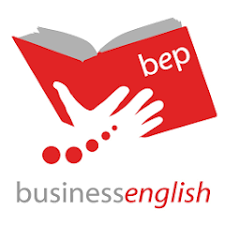
This is a Business English app from the hosts of the Business English Pod (see point 4 above).
You’ll learn English conversation skills, vocabulary, English idioms, and more, with lessons that focus on meetings, presentations, negotiations, sales, job interviews, and finance.
The Oxford Dictionary of Finance

According to its developers, this is “the most comprehensive and up-to-date dictionary of finance available”. A must if you work in this industry!
Depending on your profession, you can also download apps that are most relevant to what you do.
For example, if you’re an civil engineer, you can search for apps that are related to buildings and construction.
Do some research and see what you can find.
7. Follow Teachers And Coaches On Social Media
I have many Business English teacher colleagues who regularly post amazing content on social media. Some of them may even have experience in your job as they worked in your industry before becoming language teachers.
- Rachel Williams, for example, is a former nurse who helps international doctors to become confident and fluent communicators in English.
- Judie Yoder from English With Purpose has a team to help international professionals work for a better world.
- Heather Hansen is a business communication coach who helps top global professionals show up, speak up, and inspire action in a changing world.
- Clare Whitmell helps professionals get to a fluent, advanced level in English. She has a podcast too.
All these amazing professionals are a click away on LinkedIn.
I’m sure you’ll find other professional teachers who can help you on LinkedIn and other social media platforms.
All you have to do, again, is a little bit of research.

8. Follow Influential Professionals
You can follow teachers and coaches but you can also follow business influencers who share valuable insights in English.
For example, if you work in marketing, following Seth Godin, a marketing guru from the US, is a must.
Think who are the most influential English speaking people in your industry and go find them online. It’s highly likely they’ve been on podcast shows and YouTube channels.
They might also have their own personal blog (Seth Godin has been posting every day on his blog for something like 20 years!)
9. Join Business Related Events

You don’t need to have advanced professional English skills to join a business related event. You just need to go!
It’s an excellent way to practice speaking in a business context and meet new people.
Here are some types of events you can consider attending:
- Business conferences
- Networking events
- Trade shows and exhibitions
- Business seminars and workshops (both online and face-to-face)
- Business Meetups
- Webinars and online events.
Google Search is your best friend here. Just Google “International business conference in [your city]” or “Upcoming business webinar” and see what comes up.
You'll not only improve your professional English but also gain valuable knowledge and experience in your field, meet people, and build connections.
10. Join Toastmasters

Toastmasters International is a nonprofit educational organisation that teaches public speaking and leadership skills through a worldwide network of clubs.
In a Toastmasters club, you'll have the opportunity to present prepared speeches on a variety of topics and receive constructive feedback from fellow members.
On their website, they say that by joining Toastmasters you will:
- Improve your public speaking skills.
- Build leadership skills.
- Maximize your potential.
- Enjoy unlimited personal growth.
- Work on networking in a small and supportive environment.
- Practice writing speeches and presenting in a group setting.
- Gain a competitive advantage in the workplace.
- Build self-confidence and self-awareness.
There are 190+ countries in the world. Toastmasters is in over 140.
By becoming a member you can work on your English communication skills in a structured and encouraging environment.
This is really an excellent platform.
Professional English
Thanks for reading another one of my guides.
Before you go and work on your professional English, remember that the best way to improve it is to use it.
So don’t be afraid to speak at meetings. Don’t worry too much about mistakes in your emails. Use the best professional English you have at the moment. That’s enough.
But of course, work at it, practice it, and study it, so you can advance your career, do business, and, most importantly, get rich!

Olly Richards
Creator of the StoryLearning® Method
Olly Richards is a renowned polyglot and language learning expert with over 15 years of experience teaching millions through his innovative StoryLearning® method. He is the creator of StoryLearning, one of the world's largest language learning blogs with 500,000+ monthly readers.
Olly has authored 30+ language learning books and courses, including the bestselling "Short Stories" series published by Teach Yourself.
When not developing new teaching methods, Richards practices what he preaches—he speaks 8 languages fluently and continues learning new ones through his own methodology.
